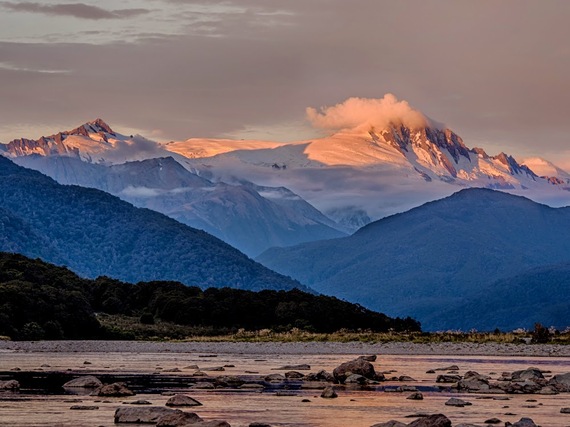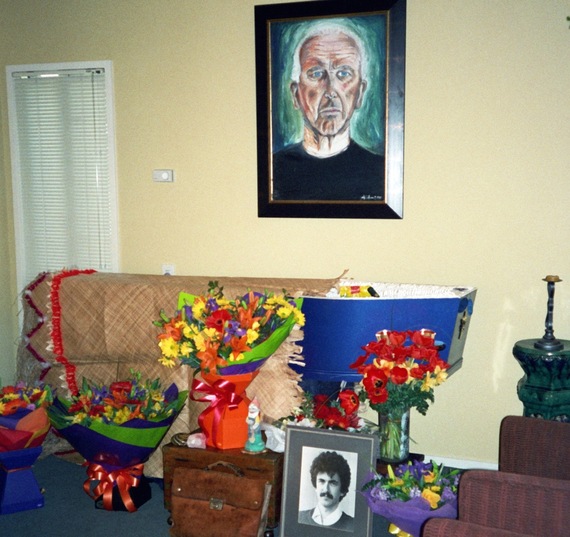I went to the funeral of a man I've never met. He was the grandfather of one of my sixth grader's best friends.
I wish I had taken my son. But being a stay-at-home dad I was the last to know about the funeral and I didn't really get organized in time. Far from getting my son out of school and appropriately dressed for an 11:00 a.m. service, I barely managed it myself.
After I hopped out of the shower at 10:45 a.m., I discovered that my one suit should have been dropped at the dry-cleaners after its most recent venture -- some months ago. I ended up in khaki pants and a navy jacket. Hardly mournful attire, especially as I had also forgotten a tie and neglected to shave.
I shuffled into a pew at the back of the church reassuring myself that given my tangential relationship with the family showing up was more important than dressing the part.
Two of the man's daughters gave a lovely eulogy. It brought a tear to my eye. I sometimes wonder if my emotional life is like a church building; ornate on the outside, but a cavernous void within. To cry at a complete stranger's funeral was reassuring to me.
Who knows why I was crying. Grief is a mysterious thing. I remember hardly crying at my own father's funeral, but weeping uncontrollably at the next funeral I attended. When you are close to the dead person it is necessary to keep a lid on things just to get through it.
I wish my son had been there to see me cry and to witness the grief of his friend and his friend's cousins. It would have been awkward for him, but that is the point. Death is part of life and I don't believe in sheltering kids from it. It is not the sort of topic one brings up in the playground, but my sense is many parents wouldn't see this as a missed opportunity.
My son would have squirmed in the pew, but at least he would have come away some idea what happens when someone dies; that pain is part of the experience of life. Maybe he could have only managed the faintest of nods to his friend outside the church but he would have shared that experience and offered some comfort.
I was three when my mother's father died. All I remember of him was he loved to bounce me on his knee and sing the Grand Old Duke of York. I do recall being left at a friend's house while the rest of the family went out of town for his funeral.
My mother says I have never forgiven her for that. When my grandmother died five years later she made sure I was rushed to the funeral home to see her body before the doors closed at 5:00 p.m.
People get squeamish about bodies, especially about letting kids see them. But bodies are important to the process of grief. A body makes a death real.

The Haast River; my brother's last resting place. © Cabin boy chronicles
When I was 15, I watched my brother drown in a wild river in New Zealand. They never recovered his body. In a way I was lucky that I witnessed his final descent into the torrent. I knew he was gone.
The rescuers told me to tell my family that there might be hope. There was none. All I gave my sister-in-law was something false to cling too. Later that night when I called my parents with the news I told my father straight up, "Sean is dead."
His cry still echoes in my memory. When my mother picked up the phone he'd dropped, I was a little less direct. My father came to terms with the loss much quicker than she did. I think my honesty helped him.
Grief is an unavoidable. You can't bury it, hide from it or out run it, so you might as well be open to it and let it take you where you need to go. While it is a very personal experience I feel on a cultural level we encourage people to shy away from looking death in the face.
William Worden speaks of four tasks one must accomplish for "the process of mourning to be completed" and "equilibrium to be reestablished". Accepting the reality and significance of the loss is the most immediate task.
That is why seeing a body is important. When my father-in-law passed away we took our toddlers to see his body. I remember they had a lot of questions and it soon dawned on me that the concept of an after life was very convenient when discussing death with children.
My father-in-law suffered from Parkinson's disease, but in death all the tension had drained out of his face. He looked at peace. Seeing him with the disease banished from his body was powerful reminder of the man. That man may have been lost for several years before he died but the extent to which we grieved his actual loss took me by surprise.
I had expected a disease like that causes one to go through a certain pre-grieving. For so long there had been a sense that his passing would be a blessing or a relief. While that was true, it did nothing to lessen the impact.
My own father died three months before our wedding. He was 70. During his illness he lamented that he probably had a few more good years left in him, but he recognized he had full life, the loss of a grown son excepted.
My late brother's wife is Samoan. She brought a wonderful Polynesian approach to death to our family. My father's body lay in state in his own living room in the days before his funeral. In keeping with their tradition my sister-in-law and other members of the Samoan branch of the family slept with his body to keep him company.
That was a bit much for some of us with British and Irish heritage but plenty of people went into the room to have a final chat with dad in his open casket. By the time it was closed it was overflowing with tributes people had sent him away with; his stethoscope, the newspaper, tennis balls, his favorite candy, bottles of wine and photos.
My children never knew my father. His coffin contained a story of his life; his interests, passions, losses and loves. I wish I had a complete list of the items that ended up in there. It would give them a window into his life, a more child-friendly picture than any eulogy could hope to paint.
